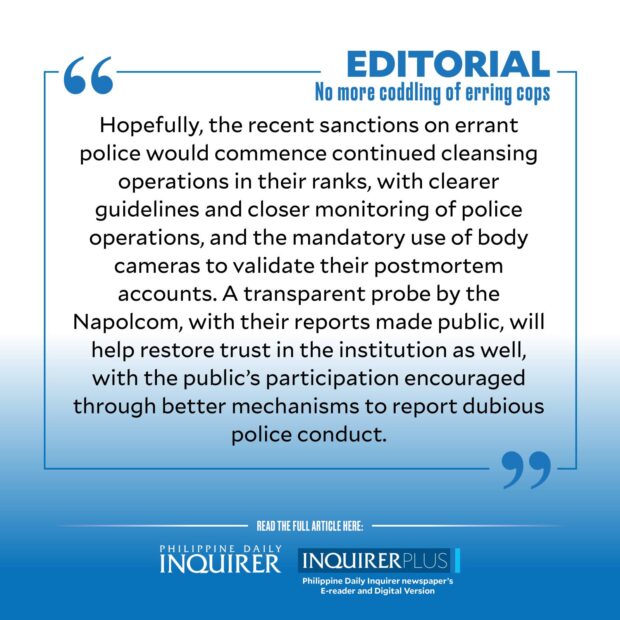No more coddling of erring cops
It’s an auspicious start to his second year in office, and one that should be pursued vigorously to its logical judicial end.
We’re referring to President Marcos’ acceptance on Tuesday of the resignation of 18 Philippine National Police senior officers that the Chief Executive has described as “unscrupulous law enforcers … involved in the highly nefarious drug trade.” The 18 are among the 953 resigned PNP officers who went through a screening by a five-man independent panel created by the National Police Commission (Napolcom) to check the police’s possible link to illegal drug activities.
The 18 senior officers who, according to PNP chief Gen. Benjamin Acorda, Jr. are “continuously being monitored,” face possible drug charges and immediate relief from their present positions. They would then be placed on floating status and reassigned to the Personnel Holding and Accounting Unit of the PNP Directorate for Personnel and Records Management “to preclude them from exerting further influence and/or performing illegal activities using their positions,” Acorda added.
The President’s decisive action on the PNP officers’ resignation sends the unmistakable message that the government is serious in cleaning up the police force notorious for abuses and shady deals, and in pinpointing accountability in the failed anti-illegal drugs campaign of his predecessor, former president Rodrigo Duterte.
That the 18 resigned officers have been named is a commendable move as well, as it shows the extent of corruption in this law enforcement body, with no less than Brigadier Generals Remus Medina, Randy Peralta, and Pablo Labra II, leading the list. The 15 others are Colonels Rogarth Campo, Rommel Ochave, Rommel Velasco, Robin Sarmiento, Fernando Ortega, Rex Derilo, Julian Olonan, Rolando Portera, Lawrence Cajipe, Dario Menor, Joel Kagayed Tampis, Michael David, Igmedio Bernaldez, Rodolfo Albotra Jr., and Marvin Sanchez.
Public naming and shaming should discourage their ilk from following suit and straying from their shown duty to serve, while maintaining the integrity of the innocent.
It may be recalled that Interior Secretary Benhur Abalos, who had appealed in January for all police generals and colonels to submit their courtesy resignations to give way to a “cleansing” of the PNP, had earlier balked at naming the erring officers, saying they should be allowed to “retire peacefully.” His stance was widely seen as giving the ranking PNP officials “a graceful exit” instead of them being sanctioned. Why the reluctance to expose the misdeeds of the police and hold them to the same standards as other drug offenders? Critics have asked.
The top officers’ link to illegal drugs is particularly aggravating as they apparently used their positions to profit from the lucrative narcotic trade. Both Medina and Peralta served as chief of the PNP’s primary anti-drug unit, the Drug Enforcement Group (DEG), under the Duterte administration. Medina headed the DEG from April 2021 to February 2022 and was succeeded by Peralta who served until July 2022.
Medina and Peralta were previously implicated as backers of dismissed Master Sgt. Rodolfo Mayo Jr., the owner of the Wealth and Personal Development Lending Inc. office in Tondo, Manila, where DEG officers seized “shabu” or crystal meth worth P6.7 billion in an October 2022 raid. Despite his reassignment to Mindanao in 2016 for his alleged involvement in illegal drugs, Mayo was recruited as an intelligence officer for the DEG’s Special Operations Unit in the National Capital Region.
Olonan, meanwhile, was among the 50 PNP personnel charged before the Office of the Ombudsman in June over their alleged involvement in that same drug operation where, it was discovered through CCTV, that several DEG officers had taken 42 kilos from the seized shabu supposedly as “reward” for police informants.
The President’s uncompromising response to the police officers’ scandalous and shameless misdeed is a welcome change from the coddling given drug operatives during the previous administration. At ceremonies installing now Sen. Ronald dela Rosa as PNP chief in July 2016, Duterte assured the police: “Do your duty, and if in the process, you kill one thousand persons … I will protect you.”
No doubt such enabling words have fed the extrajudicial killings in police drug operations that government records place at over 6,000, but which rights groups said is closer to 30,000.
Hopefully, the recent sanctions on errant police would commence continued cleansing operations in their ranks, with clearer guidelines and closer monitoring of police operations, and the mandatory use of body cameras to validate their postmortem accounts. A transparent probe by the Napolcom, with their reports made public, will help restore trust in the institution as well, with the public’s participation encouraged through better mechanisms to report dubious police conduct.
For now, we look forward to the prosecution of these law enforcers who have sullied the entire police force by being lawbreakers themselves.





















